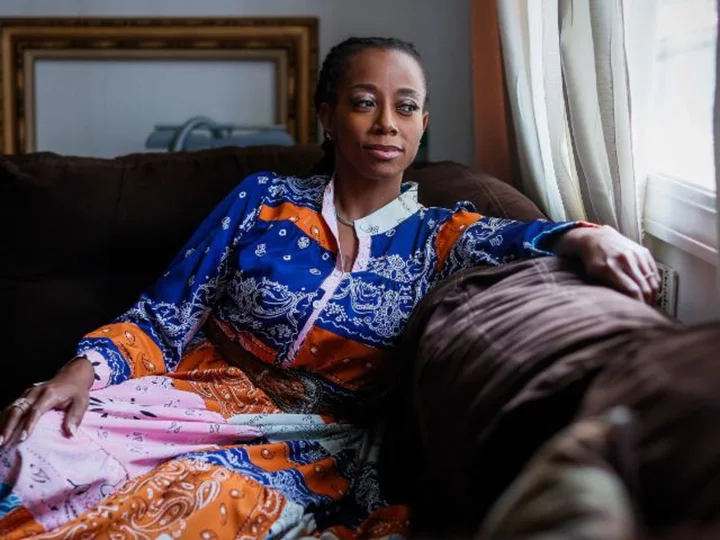Dima Hendricks said as a Black woman with a chronic illness she never thought she would be able to fulfill her dream of competing in national beauty pageants.
"I competed on a state level for over 25 years. I was able to win local and state titles, but when it was time to compete in a nationwide pageant, sickle cell reared its ugly head," Hendricks told CNN.
Hendricks is one of an estimated 100,0000 Americans living with sickle cell disease, an inherited condition in which a person's hemoglobin -- the protein that carries oxygen in the blood -- is abnormal, causing red blood cells to become shaped like a sickle, the C-shaped farming tool, according to the US Centers for Disease Control and Prevention.
The disease causes debilitating pain, swelling and blood clots. Hendricks said she was diagnosed at 6 months old and has come to rely on regular blood transfusions to treat the condition.
"Throughout my life I've had so many needles stuck in my veins that I no longer have any veins," she told CNN. "So, I have a port in my chest. It's still functional and that's where I receive most of my blood."
Now, at 41, Hendricks estimates she has received nearly 200 blood transfusions.
But in August, the American Red Cross issued a warning that it was experiencing a shortfall of nearly 30,000 blood donations, leaving Hendricks to worry if a national shortage could complicate treatment not only for herself, but for the thousands of Americans who also suffer from sickle cell disease.
What is sickle cell disease?
According to the CDC, sickle cell disease describes a collection of red blood cell disorders.
Dr. Yvette Miller, medical executive officer for the American Red Cross, said while anyone can be impacted by the disease, it is prevalent among Black Americans and those with African descent.
Nearly 1 in 13 Black children in the US are born with the trait for the disease, according to the CDC.
Miller said simply having the trait doesn't mean you will inherit the disease, but if both parents have the marker, they are more likely to pass the condition to their child. The disease is diagnosed through a blood test, and it is more common in parts of world where malaria is endemic, Miller said.
People diagnosed with sickle cell disorder are at an increased risk of blood clots and stroke, according to Miller, because the sickle-shaped red blood cells can get lodged in the bloodstream, preventing blood flow to tissues and major arteries.
"Whenever our organs and tissues cannot receive oxygen, the primary manifestation is the development of pain," she said.
When tissues and arteries fail to receive oxygen it can lead to what's known as "a pain crisis," she added.
What is it like to live with the disease?
Hendricks, a mother of two, said when she experiences a pain crisis narcotics are not enough to help her find relief.
"I would rather have a child naturally and a Cesarean again before I go through a full crisis -- it's that painful," she said. "I have to wake up with sickle cell in mind. I have to go to bed with sickle cell in mind. It overtakes every facet of my being."
Hendricks said a stroke she had when she was 11 years old impaired her vision. She has also had open-heart surgery to treat blood clots as a result of the disease.
To avoid setting off a pain crisis, she said she monitors her oxygen levels, hydration and stress. But even traveling with the disease can be complicated, and Hendricks said she often brings a portable oxygen compressor.
When a sickle cell crisis does happen, Hendricks said it often "occurs suddenly and can last for hours, days, or even weeks."
Managing the disease has taken a toll on her mental health, she said.
"If something scares me, it triggers a crisis. High stress levels, it triggers a crisis," she said. "It's just so overwhelming, it can drive someone absolutely crazy."
What treatments are available?
According to Miller, blood transfusions are one of the primary medical treatments for people with sickle cell disease.
During the transfusion, "we remove a significant proportion of their red blood cells and infuse them with normal red blood cells," she said.
The transfused red blood cells "can now carry oxygen normally and that can prevent some of the complications of sickle cell disease," Miller added.
This is among the many reasons why maintaining the nation's supply of donor blood is important, she added.
Outside of transfusions, there are several drugs available to help treat the disease, and in 2021 the US Food and Drug Administration approved use of the gene editing tool, CRISPR-Cas-9, in human clinical trials to develop new treatments, CNN previously reported.
Currently, the only known cures for the disease are bone marrow and stem cell transplants, according to Miller.
Those with sickle cell disease can also manage the condition through self-care, staying hydrated and knowing their triggers for a pain crisis -- like cold weather or stress -- and trying to avoid them, Miller said.
How does a shortage of donor blood impact sickle cell patients?
Miller said a national donor blood shortage could severely impact treatment for Americans with sickle cell disease, and in some cases it could be life-threatening. Shortages would mean that critical blood transfusions may have to be postponed, she said.
"It might be a couple of months before they can get their transfusion, if there are not enough units," she said.
"They may not be able to get the transfusions that they need to improve their health and welfare, to deal with the crises and to address their chronic complications."
The Red Cross has issued an urgent plea for Black Americans to donate blood because 1 in 3 are a donor match for people with sickle cell disease, according to the organization.
Sickle cell patients can develop an immune response to blood from donors that are not closely matched to the recipient. Those antibodies can lead to severe complications, the organization said on its website.
Miller said the Red Cross has seen an increase in people making appointments to donate blood but urges everyone to follow through on their commitment.
While Hendricks is concerned about the blood donor shortage, she has also tried to lead a normal life as both a mother and a pageant contestant. Earlier this month, she said she was able to compete in a national championship for the first time. She was the first runner-up and received a community outreach award.
"I'm more excited about being able to experience the life that sickle cell tried to steal from me than any award," she said.









